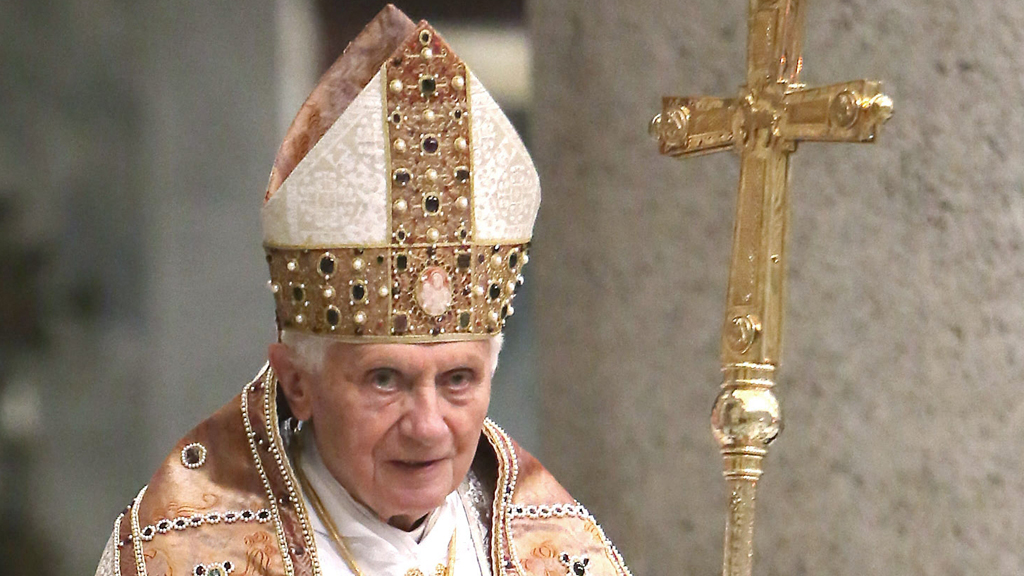Pope Benedict XVI to step down
The Pope is to resign at the end of February, saying that he no longer has the “strength of mind and body” required to “adequately fulfil the ministry entrusted to me”.

In a statement on the Vatican Radio website, Pope Benedict said:
“I am well aware that this ministry, due to its essential spiritual nature, must be carried out not only with words and deeds, but no less with prayer and suffering.
“However, in today’s world, subject to so many rapid changes and shaken by questions of deep relevance for the life of faith, in order to govern the bark of Saint Peter and proclaim the gospel, both strength of mind and body are necessary, strength which in the last few months has deteriorated in me to the extent that I have had to recognise my incapacity to adequately fulfil the ministry entrusted me.
“For this reason, and well aware of the seriousness of this act, with full freedom I declare that I renounce the ministry of the Bishop of Rome.”
Mild stroke
The pontiff, who is 85, became the 265th Pope in April 2005.
Concerns were expressed not long after Joseph Ratzinger became Pope, aged 78, about the strains the job would place on him.
I have had to recognise my incapacity to adequately fulfil the ministry entrusted me. Pope Benedict XVI
There have been unconfirmed stories about the Pope‘s health in recent years, and he was revealed in May 2005 to have suffered a mild stroke in the 1990s.
Pope Benedict has distinguished himself, both as Pope and previously as archbishop and cardinal, for his traditional approach to Catholic doctrine.
His term as pontiff has also been been punctuated by allegations of sex abuse by Catholic priests. In September 2011 the Vatican was forced to defend itself against acacusations from the Irish parliament that it had sought to cover up child sex abuse by its priests and undermine child protection laws.
‘Gobsmacked’
Mark Greaves, deputy editor of the Catholic Herald newspaper, said his initial reaction to the Vatican’s announcement had been disbelief. “We’re absolutely gobsmacked,” he told Channel 4 News.
“He’s always been a Pope who’s not been afraid to make unconventional choices and surprise people. He said in an interview with a German journalist that he might resign if he thought his faculties were not up to the job – and that’s what’s happened.
“He seems to have become a bit more frail over the last couple of years. He has a cane, and he’s started using a mobile platform to move about rather than walk the full length of the basilica in Rome.
“He’s been cutting down on foreign trips as well.”
Powerful communicator
Looking forward to Benedict XVI’s replacement, Mark Greaves said it was difficult to imagine someone who could live up to his precessor’s standards.
“I think he’s a very powerful writer and communicator, bringing a freshness to the church’s teachings. He brings fresh insight – although the teachings have stayed the same for a long time.
His big attractions have been more in what he’s expressed than in how he’s expressed it. Mark Greaves, Catholic Herald
“In all his addresses and all the things he’s written, whenever you hear him speak you always want to read what he’s said because it’s always carefully thought through.
“He’s a much quieter, less extrovert figure than John Paul, and his big attractions have been more in what he’s expressed than in how he’s expressed it.”
Likely front-runners
Attention will now focus on the Joseph Ratzinger’s replacement. Cardinal Angelo Scola, the present archbishop of Milan, is among the likely front-runners, as are Cardinal Timothy Dolan, archbishop of New York, and Archbishop Luis Antonio Tagle, archbishop of Manila.
Of Archbishop Tagle, Mark Greaves notes that he is the most popular cardinal on Facebook, with 116,000 “likes”.
In theological terms, it is probable that Rome’s college of cardinals – the body entrusted with electing the new pontiff – will choose someone with a similar approach to Benedict XVI in regard to the Catholic church’s core teachings.
“It won’t be someone who’ll want to change things but someone who can communicate well with the modern world,” says Mark Greaves.
“It’s extremely unlikely that a Pope will be elected who’ll make any sort of radical changes.”
-
Latest news
-
‘Russian aggressions have never pushed Georgia to deviate from its own path’, says Georgian President5m

-
Why is Georgia’s ruling party so intent on adopting ‘foreign influence’ bill?5m

-
Trump’s lawyers try to paint Michael Cohen as liar out for revenge at trial3m

-
England’s schools told not teach gender identity2m

-
Slovakia PM shooting: Suspect charged with attempted murder3m

-




